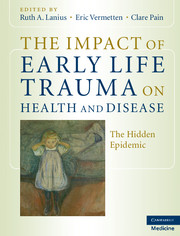Book contents
- The Impact of Early Life Trauma on Health and Disease
- The Impact of Early Life Trauma on Health and Disease
- Copyright page
- Contents
- Contributors
- Foreword
- Acknowledgements
- Section 1 Early life trauma: impact on health and disease
- Section 2 Biological approaches to early life trauma
- Section 3 Clinical perspectives: assessment and treatment of trauma spectrum disorders
- Chapter 19 Assessing the effects of early and later childhood trauma in adults
- Chapter 20 Memory and trauma: examining disruptions in implicit, explicit and autobiographical memory
- Chapter 21 Scientific progress and methodological issues in the study of recovered and false memories of trauma
- Chapter 22 Thepsychosocial consequences of organized violence on children
- Part 5 Synopsis
- Chapter 23 Therole of mentalizing in treating attachment trauma
- Chapter 24 Pragmatic approaches to stage-oriented treatment for early life trauma-related complex post-traumatic stress and dissociative disorders
- Chapter 25 Cognitive-behavioral treatments for post-traumatic stress disorder
- Chapter 26 Emotions and emotion regulation in the process of trauma recovery: implications for the treatment of post-traumatic stress disorder
- Chapter 27 Psychodynamic psychotherapy: adaptations for the treatment of patients with chronic complex post-traumatic stress disorder
- Part 6 Synopsis
- Epilogue
- Index
Chapter 19 - Assessing the effects of early and later childhood trauma in adults
from Section 3 - Clinical perspectives: assessment and treatment of trauma spectrum disorders
Published online by Cambridge University Press: 03 May 2011
- The Impact of Early Life Trauma on Health and Disease
- The Impact of Early Life Trauma on Health and Disease
- Copyright page
- Contents
- Contributors
- Foreword
- Acknowledgements
- Section 1 Early life trauma: impact on health and disease
- Section 2 Biological approaches to early life trauma
- Section 3 Clinical perspectives: assessment and treatment of trauma spectrum disorders
- Chapter 19 Assessing the effects of early and later childhood trauma in adults
- Chapter 20 Memory and trauma: examining disruptions in implicit, explicit and autobiographical memory
- Chapter 21 Scientific progress and methodological issues in the study of recovered and false memories of trauma
- Chapter 22 Thepsychosocial consequences of organized violence on children
- Part 5 Synopsis
- Chapter 23 Therole of mentalizing in treating attachment trauma
- Chapter 24 Pragmatic approaches to stage-oriented treatment for early life trauma-related complex post-traumatic stress and dissociative disorders
- Chapter 25 Cognitive-behavioral treatments for post-traumatic stress disorder
- Chapter 26 Emotions and emotion regulation in the process of trauma recovery: implications for the treatment of post-traumatic stress disorder
- Chapter 27 Psychodynamic psychotherapy: adaptations for the treatment of patients with chronic complex post-traumatic stress disorder
- Part 6 Synopsis
- Epilogue
- Index
Summary
Keywords
- Type
- Chapter
- Information
- The Impact of Early Life Trauma on Health and DiseaseThe Hidden Epidemic, pp. 207 - 216Publisher: Cambridge University PressPrint publication year: 2010
- 2
- Cited by

